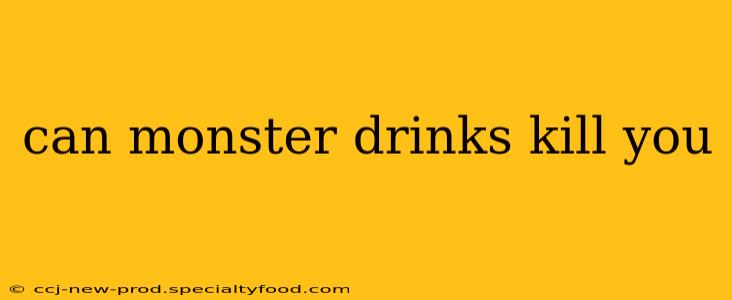Can Monster Drinks Kill You? Unpacking the Risks of Energy Drinks
The question, "Can Monster drinks kill you?" is a serious one, sparking concern among parents, health professionals, and consumers alike. While a single Monster energy drink won't likely kill a healthy adult, the potential for serious health risks, even death, exists, particularly with excessive consumption or pre-existing health conditions. Let's delve into the specifics.
What's in Monster Energy that could be harmful?
Monster Energy, like other energy drinks, contains a potent cocktail of ingredients that, in high doses or for vulnerable individuals, can be dangerous. Key components include:
-
Caffeine: This stimulant is the primary driver of the energy boost, but excessive intake can lead to heart palpitations, anxiety, insomnia, and even seizures. The caffeine content in Monster varies by can size, but it's significantly higher than that of coffee.
-
Sugar: Many Monster varieties are loaded with sugar, contributing to weight gain, type 2 diabetes, and other metabolic problems. High sugar intake can also negatively impact heart health.
-
Guarana: This natural source of caffeine adds to the overall stimulant effect, further amplifying the potential for adverse reactions.
-
Taurine: While naturally occurring in the body, the high levels in Monster, combined with other stimulants, may contribute to cardiovascular issues.
-
B Vitamins: While essential for health, the quantities in energy drinks are generally not significant enough to provide notable benefits.
Can too much Monster cause a heart attack?
While a Monster energy drink itself is unlikely to directly cause a heart attack in a healthy individual, it can significantly contribute to cardiac risk factors. The high caffeine content can increase heart rate and blood pressure, putting stress on the cardiovascular system. This risk is magnified for individuals with pre-existing heart conditions or those sensitive to stimulants. In cases of extreme consumption, the combined effects of caffeine, sugar, and other ingredients could potentially trigger a cardiac event, particularly in vulnerable populations.
How much Monster is too much?
There's no universally safe amount of Monster energy drink for everyone. The effects of caffeine and other ingredients vary greatly depending on individual factors such as age, weight, health status, and caffeine tolerance. However, health organizations generally recommend limiting or avoiding energy drinks, especially for children and adolescents. Adults should also consume these beverages sparingly, if at all.
What are the long-term effects of drinking Monster?
Chronic consumption of Monster energy drinks can lead to a variety of long-term health problems, including:
-
Dental problems: The high sugar content contributes to tooth decay and enamel erosion.
-
Sleep disturbances: The caffeine can interfere with sleep patterns, leading to insomnia and fatigue.
-
Anxiety and depression: Excessive stimulant intake can exacerbate anxiety and depression symptoms.
-
Weight gain and obesity: High sugar and calorie content promote weight gain.
-
Metabolic disorders: Increased risk of type 2 diabetes and other metabolic issues.
-
Cardiovascular problems: Long-term stress on the cardiovascular system can increase the risk of heart disease.
Are there any safer alternatives to Monster Energy?
For a natural energy boost, consider:
-
Water: Staying hydrated is crucial for energy levels and overall health.
-
Fruit and vegetables: Nutrient-rich foods provide sustained energy without the harmful effects of energy drinks.
-
Whole grains: Complex carbohydrates provide a steady release of energy.
-
Moderate exercise: Physical activity can improve energy levels and mood.
-
Adequate sleep: Sufficient sleep is essential for optimal energy and cognitive function.
Disclaimer: This information is for educational purposes only and should not be considered medical advice. If you have concerns about the effects of energy drinks on your health, consult a healthcare professional.
